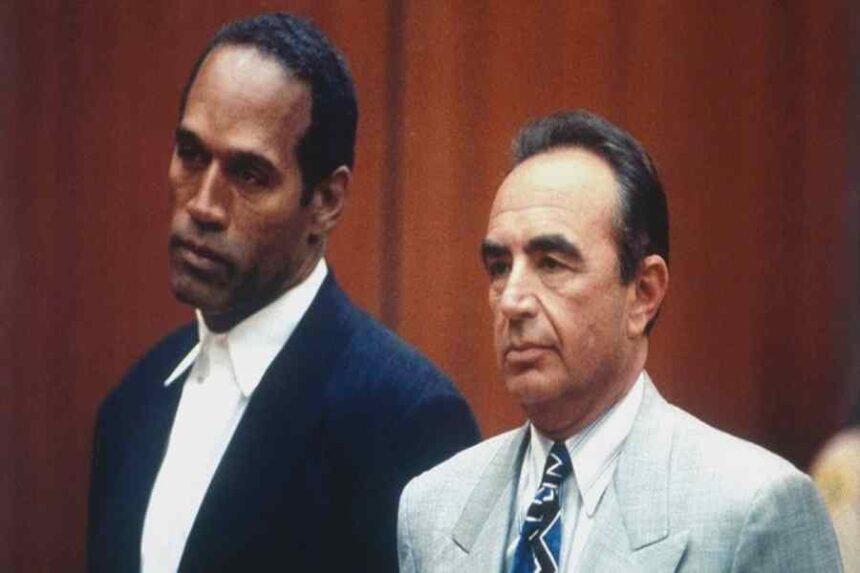The O.J. Simpson trial, one of the most publicized court cases in American history, captivated the nation in 1995. The trial, which was televised, brought immense fame to the “Dream Team,” Simpson’s high-profile defense attorneys. As we mark 30 years since the murders of Nicole Brown Simpson and Ron Goldman, we revisit the key figures from the case and see where they are today.
Johnnie Cochran
Johnnie L. Cochran Jr. led Simpson’s defense with the famous phrase, “If it doesn’t fit, you must acquit,” referring to the bloody gloves found at the crime scene. His dynamic courtroom presence helped secure Simpson’s acquittal. After the trial, Cochran expanded his law practice across 15 states, frequently appeared on television, and inspired the character Jackie Chiles on “Seinfeld.” Cochran represented several high-profile clients, including Sean “Diddy” Combs and Michael Jackson. He became a symbol of legal prowess and civil rights advocacy. Cochran passed away from brain cancer in 2005 at the age of 67, leaving behind a legacy as one of the most influential lawyers of his time.
Robert Kardashian
Robert Kardashian, a close friend of Simpson since their college days, reactivated his law license to join the defense team. Kardashian famously read Simpson’s note to the media during the infamous Bronco chase. His personal connection to Simpson and his role in the trial brought him into the limelight. Kardashian passed away in 2003 from esophageal cancer at 59. His fame has been overshadowed by his family’s reality TV success, particularly his ex-wife Kris and children Kourtney, Kim, Khloe, and Rob Kardashian. The Kardashian family has since become a significant presence in American pop culture.
Robert Shapiro
Robert Shapiro was the initial leader of Simpson’s defense team. Post-trial, Shapiro criticized his colleagues’ strategies, particularly Cochran’s focus on race. He continues to practice law and has represented various high-profile clients. Shapiro co-founded the legal service company LegalZoom, which provides affordable legal help to the public, and started a foundation in honor of his son, who died of a drug overdose. He has also authored books on legal strategy and ethics. Recognized as one of the “500 Leading Lawyers in America” in 2023, Shapiro remains a prominent figure in the legal community, advocating for legal reform and accessibility.
Barry Scheck
Barry Scheck introduced DNA evidence to the courtroom, challenging the prosecution’s forensic methods and highlighting mishandling of evidence. He co-founded the Innocence Project in 1992, which has since exonerated hundreds of wrongfully convicted individuals using DNA evidence. Scheck’s work has had a profound impact on the criminal justice system, promoting the use of scientific evidence to prevent wrongful convictions. He remains active in the legal community and serves as a professor at the Benjamin N. Cardozo School of Law. Scheck’s contributions have earned him numerous awards and recognition for his dedication to justice and legal integrity.
Lee Bailey
Lee Bailey was known for his courtroom theatrics and high-profile cases, including the defense of Patty Hearst. Bailey’s legal career ended in disbarment in 2001 for misconduct involving client funds. Despite his fall from grace, Bailey’s earlier career was marked by several landmark cases that showcased his skill as a defense attorney. He passed away in 2021 at the age of 87 after a prolonged illness. Bailey’s legacy is a mix of brilliance and controversy, reflecting the highs and lows of a career spent in the public eye.
Alan Dershowitz
Alan Dershowitz, a Harvard law professor, played a crucial role in Simpson’s defense by consulting on scientific aspects. Since the trial, he has been involved in several controversial cases, including defending Jeffrey Epstein and consulting for Julian Assange and Harvey Weinstein. Dershowitz also joined Donald Trump’s legal team during his impeachment trial. He continues to write and lecture on legal issues, maintaining a presence in both academia and public discourse. Dershowitz’s career has been marked by his willingness to take on challenging and often unpopular cases, showcasing his belief in the legal principle that everyone deserves a defense.
Marcia Clark
Marcia Clark, the lead prosecutor, left law practice after the trial. She has since become a bestselling author and TV commentator, providing insights on legal issues and high-profile cases. Clark’s experience during the Simpson trial has been a focal point of her career, leading to her writing several legal thrillers that draw on her courtroom experiences. She has also contributed to true crime publications, sharing her expertise with a broader audience. Clark’s transformation from prosecutor to author and commentator highlights her adaptability and resilience in the face of intense public scrutiny.
Chris Darden
Chris Darden, co-prosecutor, faced criticism for having Simpson try on the infamous gloves in court. He resigned from the district attorney’s office post-trial and later founded his own law firm, Darden and Associates Inc. Darden has appeared as a legal commentator and briefly represented high-profile clients like Eric Ronald Holder Jr., the man accused of murdering rapper Nipsey Hussle. Darden’s career has been a mix of private practice and public commentary, allowing him to share his legal insights while continuing to advocate for justice. His work in the legal field continues to be influenced by his experiences during the Simpson trial.
Judge Lance Ito
Judge Lance Ito, who presided over the trial, retired in 2015 after overseeing approximately 500 trials. The trial’s media circus led to segments like “The Dancing Itos” on “The Tonight Show,” reflecting the cultural impact of the case. Ito remains private and avoids interviews, adhering to ethical guidelines for judges. His decision to televise the trial has been both criticized and studied as a significant moment in American legal history. Ito’s career, marked by the Simpson trial, underscores the challenges judges face in high-profile cases and the lasting implications of their decisions.
The O.J. Simpson trial remains a significant part of American legal history, with its key figures continuing to influence the legal landscape in various ways. Thirty years on, the case still resonates, reflecting the ongoing impact of this landmark trial. From legal reforms and educational contributions to media presence and continued advocacy, the individuals involved in the trial have left an indelible mark on the justice system and popular culture. The trial serves as a reminder of the complexities and challenges of the legal process, and the enduring importance of justice and the rule of law.




